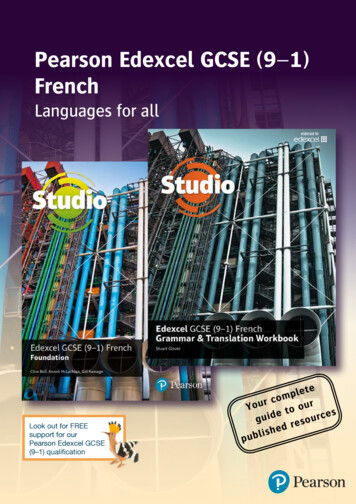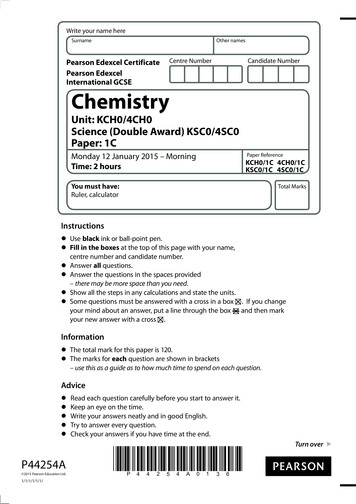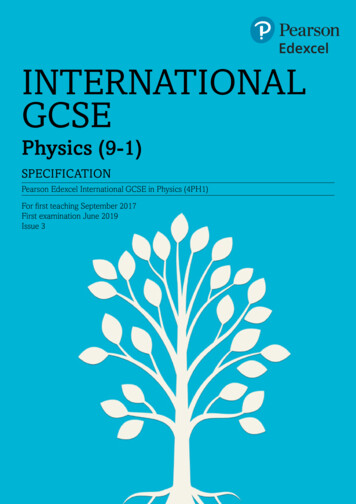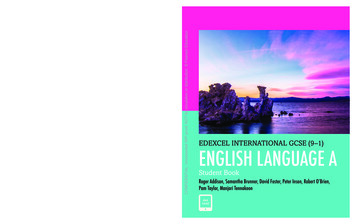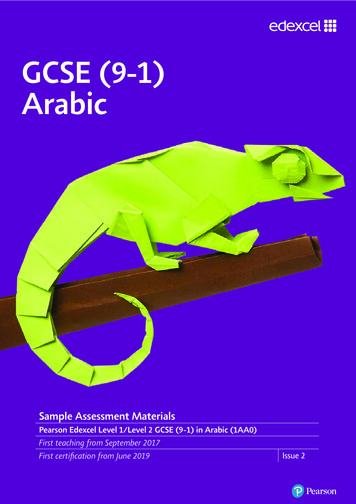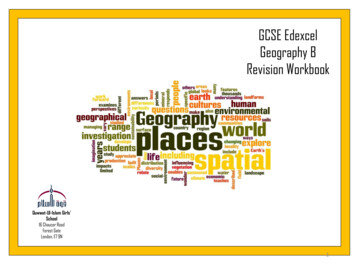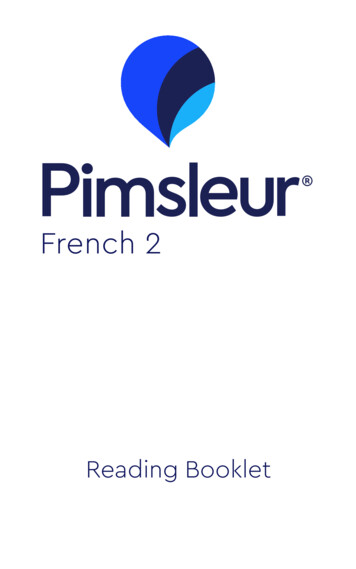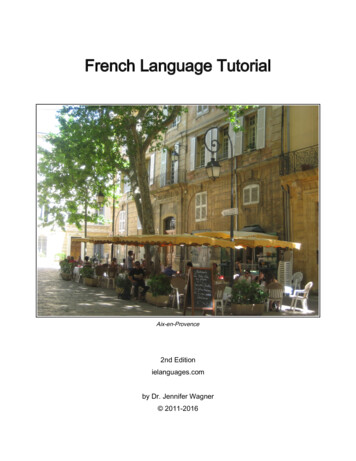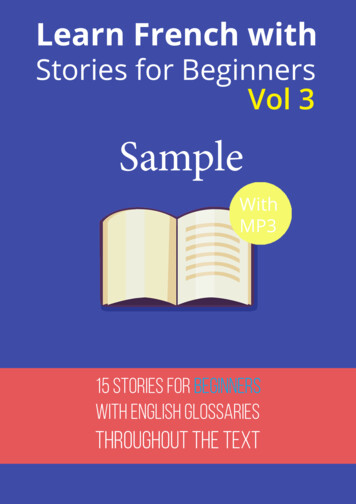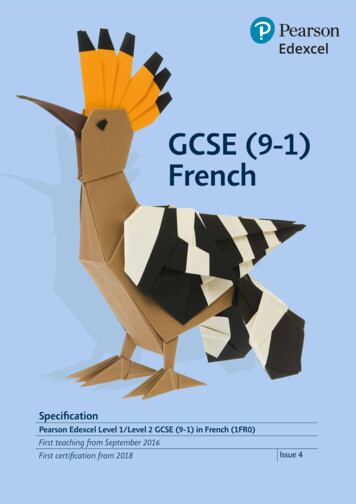
Transcription
GCSE (9-1)FrenchSpecificationPearson Edexcel Level 1/Level 2 GCSE (9 - 1) in French (1FR0)First teaching from September 2016First certification from 2018Issue 4
Summary of Pearson Edexcel Level 1/Level 2GCSE (9-1) in French specificationIssue 4 changesSummary of changes made between previous issue and this current issuePagenumberAssessment information for Paper 1 amended with updated guidance on how toaccess the recordings for the listening assessment.10‘Recordings will be issued as audio files via our Secure Download Service (SDS) priorto the exam.’Assessment information for Paper 2 amended with updated guidance on how tosubmit recordings of the speaking assessment.‘Complete, unedited recordings of all assessments must be submitted to Pearson viathe online Learner Work Transfer (LWT) portal’If you need further information on these changes or what they mean, contact us via ourwebsite at: tml.13
Contents1Introduction2Why choose Edexcel GCSE French?2Supporting you in planning and implementing this qualification3Qualification at a glance426Subject content and assessment informationThemes and topics7Paper 1: Listening and understanding in French9Paper 2: Speaking in French11Paper 3: Reading and understanding in French36Paper 4: Writing in French38Assessment Objectives62363Administration and general informationEntries63Access arrangements, reasonable adjustments, special consideration andmalpractice63Student recruitment and progression66Appendix 1: Candidate speaking examination record form (CS2)69Appendix 2: Grammar list70Appendix 3: Vocabulary list73Appendix 4: The context for the development of thisqualification150Appendix 5: Transferable skills152Appendix 6: Codes153
1 IntroductionWhy choose Edexcel GCSE French?We believe languages should be accessible for all students. Our new Pearson EdexcelLevel 1/Level 2 GCSE (9–1) in French has been developed to help students of all abilitiesprogress and develop a passion for languages, through culturally engaging content.We’ve listened to feedback from the languages community – subject associations, academicsand advisors, together with hundreds of teachers and students – and have developed anengaging and inspirational course of study that will enable your students to manipulate anduse the target language effectively, independently and creatively, so that they have a solidbasis from which to progress to A Level or employment.Engaging and popular topicsOur specification includes both familiar and new topics that you have told us you like andthat motivate your students.Manageable contentOur content has been structured across five themes. This flexible programme of study allowstime for a focused revision period at the end of the course.Content and assessments that provide an engaging real-world focusThe authentic situations and stimuli enable students to see language in context and learnabout the culture of the target language country. Our assessments allow for spontaneity andtest grammar, as well as providing plenty of opportunities for students to apply theirknowledge independently, creatively, and in authentic situations.Straightforward assessments that are accessible to all studentsSpecial care has been taken to ensure that all our papers are designed to be clear andconcise and, where appropriate, questions feature scaffolding to help all students’ progressthrough the assessments confidently. Reading and listening papers are structured so thatquestions set in the target language are in a separate section from those questions requiringresponses in English. Both papers are also structured so that they are progressive in theirlevel of demand with the most demanding question being the final question in the paper.Translation tasks are progressive in their level of difficulty and are of appropriate demand ateach tier.Carefully selected textsWe have worked closely with teachers and expert practitioners to ensure we includeinteresting and relevant texts at the right level for students at each tier and that willencourage the use of a wide range of texts in the classroom.Clear and precise assessment criteriaOur mark schemes have been trialled with sample student answers to ensure they rewardstudents appropriately and that it is clear what is expected of students at each band.Continuous progressionOur content builds on the understanding developed at KS2 and KS3 while also ensuring thatstudents new to the subject are appropriately supported, and provides a firm foundation forstudents to make a smooth transition to A Level.2Pearson Edexcel Level 1/Level 2 GCSE (9-1) in French – SpecificationIssue 4 – March 2022 Pearson Education Limited 2022
Supporting you in planning and implementingthis qualificationPlanning To support you in delivering this specification, our Getting Started Guide available onour website gives you an overview of the new GCSE qualification to help you to get togrips with the changes to content and assessment and to help you understand what thesechanges mean for you and your students. We will give you an editable course planner and scheme of work that you can adapt tosuit your department. Our mapping documents highlight key differences between the new and 2012qualification.Teaching and learningThere are lots of free teaching and learning support to help you deliver the new qualification,including: translation and literary text booklets a guide to questions in the target language a network of leading practitioners across the country student guide online and face-to-face training events.Published resources and CPD events will also be available to help you deliver the newqualification.Preparing for examsWe also provide a range of resources to help you prepare your students for the assessments,including: additional assessment materials to support formative assessments and mock exams marked exemplars of student work with examiner commentaries ExamWizard, our exam preparation tool, containing sample assessment materials foreach skill.ResultsPlusResutsPlus provides the most detailed analysis available of your students’ examperformance. It can help you identify the topics and skills where further learning wouldbenefit your students.Get help and supportOur subject advisor service, led by Alistair Drewery, and online community will ensure youreceive help and guidance from us and that you can share ideas and information with otherteachers. You can sign up to receive e-newsletters to keep up to date with qualificationupdates and product and service news.Learn more at qualifications.pearson.comPearson Edexcel Level 1/Level 2 GCSE (9-1) in French – SpecificationIssue 4 – March 2022 Pearson Education Limited 20223
Qualification at a glanceContent and assessment overviewThe Pearson Edexcel Level 1/Level 2 GCSE (9-1) in French consists of four externallyexamined papers based on the following skills: listening, speaking, reading and writing.Students must complete their speaking assessment in April/May and all other assessments inMay/June in any single year.Each paper is available at Foundation tier or Higher tier. Students must be entered for asingle tier across all papers.The use of dictionaries is not permitted. For Paper 2 this includes during thepreparation time.Paper 1: Listening and understanding in French *(Paper code: 1FR0/1F and 1H)Written examinationFoundation tier: 35 minutes including 5 minutes’ reading time; 50 marksHigher tier: 45 minutes including 5 minutes’ reading time; 50 marks25% of the total qualificationContent overviewThis paper draws on vocabulary and structures across all the themes and topics(see pages 7–8).Assessment overviewStudents are assessed on their understanding of standard spoken French by one or morespeakers in a range of public and social settings. Students will respond to multiple-responseand short-answer open response questions based on a recording featuring male and femaleFrench speakers.Students must answer all questions in both sections.There is no requirement for students to produce written responses in French.Foundation tier Section A is set in English. The instructions to students are in English. Section B is set in French. The instructions to students are in French.Higher tier Section A is set in French. The instructions to students are in French. Section B is set in English. The instructions to students are in English.Paper 2: Speaking in French *(Paper code: 1FR0/2F and 2H)Internally conducted and externally assessedFoundation tier: 7–9 minutes plus 12 minutes’ preparation time; 70 marksHigher tier: 10–12 minutes plus 12 minutes’ preparation time; 70 marks25% of the total qualificationContent overviewThis paper draws on vocabulary and structures across all the themes and topics(see pages 7–8).4Pearson Edexcel Level 1/Level 2 GCSE (9-1) in French – SpecificationIssue 4 – March 2022 Pearson Education Limited 2022
Paper 2: Speaking in French *(Paper code: 1FR0/2F and 2H)Assessment overviewStudents are assessed on their ability to communicate and interact effectively throughspeaking in French for different purposes and in different settings.There are three tasks which must be conducted in the following order:Task 1 – a role play based on one topic that is allocated by Pearson.Task 2 – questions based on a picture stimulus based on one topic that is allocated by Pearson.Task 3 – conversation based on two themes. The first theme is based on the topic chosen bythe student in advance of the assessment. The second theme is allocated by Pearson.The assessments are conducted by teachers in one session within a five week prescribedassessment period and the recordings then submitted to Pearson for external marking.Paper 3: Reading and understanding in French *(Paper code: 1FR0/3F and 3H)Written examinationFoundation tier: 45 minutes; 50 marks. Higher tier: 1 hour; 50 marks25% of the total qualificationContent overviewThis paper draws on vocabulary and structures across all the themes and topics(see pages 7–8).Assessment overviewStudents are assessed on their understanding of written French across a range of differenttypes of texts, including advertisements, emails, letters, articles and literary texts. Studentsare required to respond to multiple-response and short-answer questions based on these texts.Students must answer all questions in each of the three sections:Section A is set in English. The instructions to students in English.Section B is set in French. The instructions to students in French.Section C includes a translation passage from French into English with instructions in English.Paper 4: Writing in French *(Paper code: 1FR0/4F and 4H)Written examinationFoundation tier: 1 hour 10 minutes; 60 marks. Higher tier: 1 hour 20 minutes;60 marks25% of the total qualificationContent overviewThis paper draws on vocabulary and structures across all the themes and topics(see pages 7–8).Assessment overviewStudents are assessed on their ability to communicate effectively through writing in French fordifferent purposes and audiences. Students are required to produce responses of varyinglengths and types to express ideas and opinions in French. The instructions to students are inFrench. Word counts are specified for each question. Students must answer all questions.Foundation tier – three open response questions and one translation into French.Higher tier – two open response questions and one translation into French.*See Appendix 6: Codes for a description of this code and all codes related to thisqualificationPearson Edexcel Level 1/Level 2 GCSE (9-1) in French – SpecificationIssue 4 – March 2022 Pearson Education Limited 20225
2 Subject content and assessmentinformationThe Pearson Edexcel Level 1/Level 2 GCSE in French (9-1) allows students to develop theirability to communicate with French native speakers in both speech and writing. They willstudy across a variety of contexts relevant to their age and interests and will also develop agreater awareness of culture of French-speaking communities and countries. These contextsare listed under Themes and topics on pages 7 and 8.Students will need to develop and use their knowledge and understanding of Frenchgrammar progressively through their course of study. Grammar requirements are containedin the grammar list (see Appendix 2: Grammar list).To help students build on their range of vocabulary, a list is provided of words that studentsare expected to use and understand (see Appendix 3: Vocabulary list). These lists are notexhaustive but are intended as a guide; students at both tiers will be required to understandand respond to familiar words (appropriate to the tier) that are not on the lists.Subject aims and learning objectivesThe aims and objectives of this qualification are to enable students to: develop their ability to communicate confidently and coherently with native speakers inspeech and writing, conveying what they want to say with increasing accuracy express and develop thoughts and ideas spontaneously and fluently listen to and understand clearly articulated, standard speech at near normal speed deepen their knowledge about how language works and enrich their vocabulary in orderfor them to increase their independent use and understanding of extended language in awide range of contexts acquire new knowledge, skills and ways of thinking through the ability to understand andrespond to a rich range of authentic spoken and written material, adapted and abridged,as appropriate, including literary texts develop awareness and understanding of the culture and identity of the countries andcommunities where the language is spoken be encouraged to make appropriate links to other areas of the curriculum to enablebilingual and deeper learning, where the language may become a medium for constructingand applying knowledge develop language-learning skills both for immediate use and to prepare them for furtherlanguage study and use in school, higher education or employment develop language strategies, including repair strategies.6Pearson Edexcel Level 1/Level 2 GCSE (9-1) in French – SpecificationIssue 4 – March 2022 Pearson Education Limited 2022
Themes and topicsQuestions across all four language skills are set in common contexts, addressing a range ofrelevant contemporary and cultural themes. They are organised into five themes, eachbroken down into topics and sub-topics.The five themes are: Identity and culture Local area, holiday and travel School Future aspirations, study and work International and global dimension.All themes and topics must be studied in the context of both the students’ homecountry and that of countries and communities where French is spoken.For listening and reading assessments, the majority of contexts are based on the culture andcountries where the assessed language is spoken. Students may also refer to the culture ofthe assessed language country/countries or communities in the speaking and writing papers.It is, therefore, important that students are exposed to materials relating to French-speakingcountries throughout the course.Pearson Edexcel Level 1/Level 2 GCSE (9-1) in French – SpecificationIssue 4 – March 2022 Pearson Education Limited 20227
Each topic has been highlighted in bold.All topics must be studied in the context of both the students’ home country andthat of countries and communities where French is spoken.Theme: Identity and culture Who am I?: relationships; when I was younger; what my friends and family are like;what makes a good friend; interests; socialising with friends and family; role models Daily life: customs and everyday life; food and drink; shopping; social media andtechnology (use of, advantages and disadvantages) Cultural life: celebrations and festivals; reading; music; sport; film and televisionTheme: Local area, holiday and travel Holidays: preferences; experiences; destinations Travel and tourist transactions: travel and accommodation; asking for help anddealing with problems; directions; eating out; shopping Town, region and country: weather; places to see; things to doTheme: School What school is like: school types; school day; subjects; rules and pressures; celebratingsuccess School activities: school trips; events and exchangesTheme: Future aspirations, study and work Using languages beyond the classroom: forming relationships; travel; employment Ambitions: further study; volunteering; training Work: jobs; careers and professionsTheme: International and global dimension Bringing the world together: sports events; music events; campaigns and good causes Environmental issues: being ‘green’; access to natural resources8Pearson Edexcel Level 1/Level 2 GCSE (9-1) in French – SpecificationIssue 4 – March 2022 Pearson Education Limited 2022
Paper 1: Listening and understanding in FrenchContentStudents are assessed on their understanding of standard spoken French in a variety ofscenarios.Students will need to: identify the overall message, key points, details and opinions deduce meaning from a variety of spoken texts recognise the relationship between past, present and future events recognise and respond to key information, important themes and ideas in spoken text,including authentic sources, adapted and abridged, as appropriate be able to answer questions, extract information, evaluate and draw conclusions.This paper draws on vocabulary and structures across all the themes (outlined onpages 7–8).Students are presented with recorded scenarios involving one or more speakers in public andsocial settings. Recordings include authentic sources and are based on the themes. Recordedmaterial features both male and female voices and represents different age groups.Students should be given the opportunity to become accustomed to hearing the Frenchlanguage spoken in a range of styles and registers.Recordings for individual questions within the assessment vary in length, including both shortand longer spoken passages, using both familiar language and, where appropriate, morecomplex language and abstract material, as appropriate to the tier.To prepare students adequately for this assessment, teachers should present and exploit arange of vocabulary relevant to each theme listed and build on the Key Stage 3 Programmeof Study, where appropriate.Pearson Edexcel Level 1/Level 2 GCSE (9-1) in French – SpecificationIssue 4 – March 2022 Pearson Education Limited 20229
Assessment information First assessment: May/June 2018. The assessment is out of 50 marks. Students must be allocated five minutes in which to read through the paper before thefirst extract of the recording starts. This gives students an opportunity to familiarisethemselves with the length and the layout of the paper and to read the questions beforehearing the first extract. Students will listen to the recording featuring French-language speakers who will speak ata rate appropriate to the expected level of student understanding. Each passage is recorded twice, with pauses following the second hearing to allow eachstudent sufficient time to write or note their response to each question (or part of aquestion) and to read the next question before the related extract is played. Recordings will be issued as audio files via our Secure Download Service (SDS) prior tothe exam. Each question is set in a context drawn from the topics. The assessment tasks will featuregeneral content that is familiar and accessible to all students. Students must answer all questions in both sections. Foundation tiero 35 minutes is given for the assessment, including 5 minutes’ reading time.o Section A contains 12 questions set in English. Question types will comprise bothmultiple-response and short-answer open response questions. The instructions tostudents are in English.o Section B contains two questions set in French. Question types comprise of multiple-response questions. The instructions to students are in French. Higher tiero 45 minutes is given for the assessment, including 5 minutes’ reading time.o Section A contains two questions set in French. Question types comprise of multiple-response questions. The instructions to students are in French.o Section B contains eight questions set in English. Question types comprise of bothmultiple-response and short-answer open response questions. The instructions tostudents are in English. Four of the questions will be common to both tiers. For both tiers, there is no requirement for students to produce written responses inFrench. The use of dictionaries is not permitted.Sample assessment materialsA sample paper and mark scheme for this paper can be found in the Pearson EdexcelLevel 1/Level 2 GCSE (9–1) in French Sample Assessment Materials (SAMs) document.10Pearson Edexcel Level 1/Level 2 GCSE (9-1) in French – SpecificationIssue 4 – March 2022 Pearson Education Limited 2022
Paper 2: Speaking in FrenchContentStudents are assessed on their ability to communicate and interact effectively throughspeaking in French for different purposes.Students will need to: convey information and narrate events coherently and confidently, using and adaptinglanguage for different purposes speak spontaneously, responding to unpredictable questions, points of view or situations,sustaining communication by using rephrasing or repair strategies, as appropriate use a range of vocabulary and grammatical structures accurately, including some morecomplex forms, with reference to past, present and future events make creative and more complex use of the language, as appropriate, to express andjustify their own thoughts and points of view use accurate pronunciation and intonation in order to be understood by a native speaker,however, they will be able to access the highest marks available for each task without a‘perfect’ command of French.These are assessed through a series of three consecutive tasks.Task 1 – Role playThe role play is an interaction requiring the student to ask and answer questions, toexchange information and to use different registers. The role play relates to either formal orinformal scenarios, in turn inviting the student to use either formal or informal registerrelevant to the scenario. The task is set in the register that the student is required to use, sostudents should use that register in their responses.The role plays are set and are provided by Pearson at the time of assessment together with asequencing grid and instructions. For an example, please see the Pearson Edexcel Level 1/Level 2 GCSE (9–1) in French Sample Assessment Materials (SAMs) document – Paper 2:Speaking in French, General instructions to the teacher section.Scenarios require an exchange of information. Some scenarios are transactional in nature.The scenarios are based on any of the topics from Themes 1 to 4 (listed on page 8), i.e. noton the Theme International and global dimension as this Theme lends itself better to thepicure-based task and the conversation.Task 2 – Picture-based taskThe assessment scenario is based on any of the topics (listed on page 8). The topic isallocated by Pearson at the time of assessment together with a sequencing grid andinstructions. For an example, please see the Pearson Edexcel Level 1/Level 2 GCSE (9–1) inFrench Sample Assessment Materials (SAMs) document – Paper 2: Speaking in French,General instructions to the teacher section.This assessment allows students to: describe and narrate events give information express, justify and exchange opinions.Students are required to refer to past, present and future events in this assessment at bothFoundation and Higher tiers, using different time frames.Pearson Edexcel Level 1/Level 2 GCSE (9-1) in French – SpecificationIssue 4 – March 2022 Pearson Education Limited 202211
Task 3 – ConversationThe conversation allows students to cover all of the requirements outlined in the Contentsection on page 11, including conveying information, giving points of view, developing andinitiating conversation and discussion and producing extended sequences of speech.The conversation is based on any two themes (listed on pages 7 and 8) and is in two parts.For the first part of the conversation, the student selects one topic from one theme inadvance of the assessment. The choice of topic must be agreed between the student and theteacher and must be selected no later than two weeks before the assessment takes place.This part of the conversation task starts with this first topic and then may move on to othertopics within the same theme.The second part of the conversation must be on a different theme. This will be prescribed byPearson through instructions on a sequencing grid. For an example, please see the PearsonEdexcel Level 1/Level 2 GCSE (9–1) in French Sample Assessment Materials (SAMs)document – Paper 2: Speaking in French, General instructions to the teacher section.This part of the conversation may focus on one or more topics from within the selectedtheme (see pages 7 and 8).Students are required to refer to past, present and future events in this assessment, using arange of tenses and timeframes.12Pearson Edexcel Level 1/Level 2 GCSE (9-1) in French – SpecificationIssue 4 – March 2022 Pearson Education Limited 2022
Assessment informationGeneral information First assessment: April/May 2018. The entire assessment must be conducted in French. Students complete three tasks.o Task 1 – a role play based on one topic. This is allocated by Pearson at the time ofassessment.o Task 2 – a task containing a picture and questions drawn from one topic. This isallocated by Pearson at the time of assessment.o Task 3 – conversation based on two themes. The first theme is based on the topicchosen by the student in advance of the assessment. The second theme is selected bythe teacher from a choice of two themes allocated by Pearson. Task 1 is set in the register which the student is required to use.At the time of assessment, Pearson will issue a prescribed order per student for their roleplay, picture-based task and two themes for the second part of the conversation. Theteacher does not choose the order of the cards. Pearson will provide instructions onsequencing and a sequencing grid. For an example, please see the Pearson EdexcelLevel 1/Level 2 GCSE (9–1) in French Sample Assessment Materials (SAMs) document –Paper 2: Speaking in French, General instructions to the teacher, section.This grid has been designed to help ensure each student covers a broad range of themesfrom this specification. Assessments are conducted by centres within a five-week assessment period in April andMay in any single year. Dates for the assessment period will be confirmed in the UKInformation Manual at the start of each academic year. The assessment period will notalways be continuous or be the same period each year, for example it will need toaccommodate the Easter break which changes each year. The assessment materials provided by Pearson for all tasks may be accessed by theteacher no more than three working days before the prescribed five week assessmentperiod. This is to enable the teacher to prepare for the assessment. The assessmentmaterials in this pack must not be removed from the centre premises. Assessments are conducted by teachers in one session within a prescribed assessmentwindow and then submitted to Pearson for external marking. Students are presented with instructions in English but must communicate entirely inFrench for the duration of the assessment. Complete, unedited recordings of all assessments must be submitted to Pearson via theonline Learner Work Transfer (LWT) portal. Each question is set in a context drawn from the topics. The assessment tasks will featuregeneral content that is familiar and accessible to all students. Students must be permitted 12 minutes’ preparation time to consider the questions andstimulus cards for tasks 1 and 2. Students are assessed on the quality of responses rather than length of assessment;however the assessment times are different to reflect the demand of each tier. All assessments are marked against assessment criteria, please see Marking Guidance forPaper 2 (below). All role plays are marked for communication only. Centres must have procedures in place to verify the identity of all students at the time ofthe assessment and confirm this on the Candidate speaking examination record form(CS2) (see Appendix 1). Centres are required to submit to Pearson one completedCS2 form for all students for each tier.Pearson Edexcel Level 1/Level 2 GCSE (9-1) in French – SpecificationIssue 4 – March 2022 Pearson Education Limited 202213
The use of dictionaries is not permitted during the preparation time or during theassessment.Foundation tier assessment time and marks The total assessment for the three tasks is 7 to 9 minutes plus 12 minutes’ preparationtime. The assessment is worth 70 marks. The assessment consists of the following three tasks which must be conducted in thefollowing order:o Task 1 – one role play recommended to last between one to one-and-a-half minutes for10 markso Task 2 – one picture-based task recommended to last between two-and-a-half to threeminutes for 24 markso Task 3 – a conversation recommended to last between three-and-a-half tofour-and-a-half minutes for 36 marks.Higher tier assessment time and marks The total assessment for the three tasks is 10 to 12 minutes plus 12 minutes’ preparationtime. The assessment is worth 70 marks. The assessment consists of the following three tasks which must be conducted in thefollowing order:o Task 1 – one role play recommended to last between two to two-and-a-half minutes for10 markso Task 2 – one picture-based task recommended to last between three to three-and-a-half minutes for 24 markso Task 3 – a conversation recommended to last between five to six minutes for 36 marks.14Pear
The Pearson Edexcel Level 1/Level 2 GCSE in French (9-1) allows students to develop their ability to communicate with French native speakers in both speech and writing. They will study across a variety of contexts relevant to their age and interests and will also develop a greater awareness of culture of French-speaking communities and countries.
